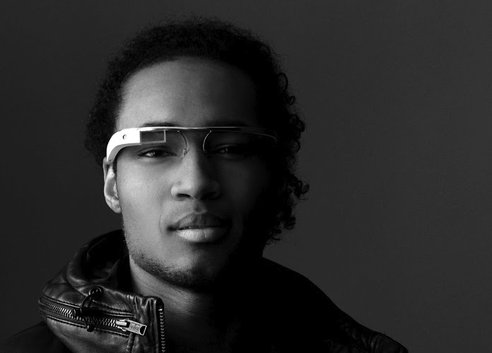Google has unveiled it’s “open secret” for a design of augmented reality eyewear. The idea is glasses that, seen in the image, partly cover the right eye and display information similar to iPhone software directly to the user. All the technology of text messaging, calendar info, reminders, even as far as receiving phone calls and viewing street directions with google map software, would be displayed upon demand for the user.
Assumptions have been made that prices may fall between $250 – $600, however the product is said to still be far from ready for market release.
The biggest challenge for the project is shrinking the technology. Issues for the eyewear were that users would have to carry separate processing and battery equipment that would plug into the glasses. If this extent of shrinking the technology that the product must achieve for it to be successful is reached, Google would have quite the competition working for the same view. In 2008, Apple filed a patent for a laser-based “head mounted display system” to stream video from an iPod among other things. More recently, Sony and Microsoft have patented similar ideas, using the aspect of a miniature display placed over the user’s eyes. It seems this is the next step for our high-tech accessorising.
The future of technology is upon us always, but such inventions like this make it much more apparent. It’s hard to not think about when these tools will avoid material construction altogether, and a chip will be implanted at birth to constantly keep one updated about one’s blood sugar level, and when it’s time to start crying in order to get a cookie. It is natural to have some apprehension, it is a terrifying prospect, the mechanization of the human being. With all the fears that robots will one day become more intelligent than people, who is to say that before that could happen, there isn’t enough to separate us from so called robots.
There is a delicate balance that we as consumers and users of society, battle with inside ourselves. These products are sold as improvements on our lives, assistants to our daily tasks and issues, but outside of thoughts for the public, the competition between the corporations ends up in who can make their product the most attractive for the public, have higher sales, and through this make more money as well as gaining the trust of the public more over than the competition. From this they then make more money. Foremost, the forwarding of technology is not considered for what is truly beneficial for humans, but if they don’t come up with the next revolutionary accessory, their company will be forgotten and their pride hurt.
On the other hand, we can’t stand still forever, truly we are never not moving. Progression is constant, although it is more noticeable at times, which is when articles like this are written. The negative issues of biological and technological incorporation would be apparent. With health, and population, who knows how we would eventually be affected. Although, is there any point in resisting invention or change? Will we ever be good?
In ten years, say we did become semi-cyborg. Everyone complains now, that it would be a breech on humanity, what it used to be like. The problem is not with invention though. If humans truly did not want to be affected by this technology, they wouldn’t be, because they wouldn’t buy it, so it would not happen. The issue is not the with the company coming up with the ideas, the problem also is not with people buying these products or how they use them. The issue overlays all of these cases and it is how we understand what we are doing and what we are. Today, society is obsessed with impressions and the idea of perception, more so being perceived. Perception is relative to what everyone sees, for example take the iPhone, which is incredibly popular. If you do not have an iPhone, it makes a statement about you and your personality that people cannot help but assume upon. It is uncontrollable due to the insecurities of individuals. They garner sadistic strength when seeing someone they assume is ‘worse’ than them, as well as an affront on their pride when someone is ‘better’ or more successful in the relativity of our culture; they have better clothes, a more fashionable hairstyle, or the latest model of technology. The problem our culture needs to escape from is this wholly unfounded fear between one another. A constant comparing against each other that our insecurity demands from us. If we can escape this trap of receiving our personal satisfaction from our position in relation to those around us, we’d be become satisfied by what genuinely interested us. Agreeably, this could be having the augmented reality eyewear from Google, however we as the mass public would not be controlled by production due to our insecurities and the competition between ourselves. Consciously the public would understand that the product is either beneficial, or not, to people, and that would lead to the decision, and the success of the product, and the affect it has, or not, on the development of time.
Ideally we will develop to where collectively we will say that ‘that next step’ is too much, and that we do not need this product, for it is not aiding or improving anything but our insecure pride. One day, hopefully, we will not need to satisfy our notions of self-worth with shopping and accessorising, but instead, our satisfaction will be affected by the general, the collective, from the important improvement of our mentality, the planet, our culture, the future. The concious aim to harness and focus on what really is manipulating and hurting our societies.



